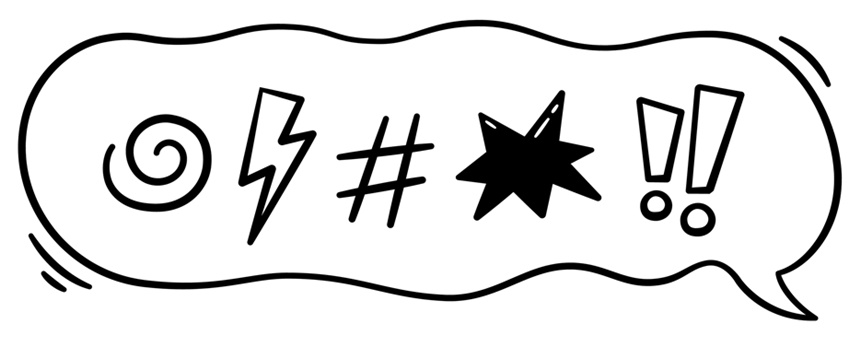If you think American speech has slid from a “PG” to an “R” rating, you’re not alone. It appears that profane speech is becoming more common in America.
A corporate research company recently studied transcripts of conference calls. It found the use of expletives among call-attendees rose 80 percent between 2018 and 2021. And it appears younger generations are more expletive-prone. According to one report, Baby Boomers use profanity 10 times a day, but members of Gen Z swear 24 times a day.
Swearing certainly isn’t anything new to Americans. In the 1800s, Saturday Evening Post editors were denouncing the users of rough speech:
Profanity is as impolite as it is sinful.
Of all the vices…man has been able to invent, there is none that furnishes a more melancholy evidence of moral degradation and depravity of mind, than the practice of profane swearing in common conversation; because it is attended with no possible advantage or pleasure.
Among young men in particular it seems to be fashionable to swear even in ordinary conversation.
Habitual indulgence confirms bad practices, hence many have become notorious swearers who, a year or two ago, would shudder at the mention of an oath. All immoral practices, it may be said, are disreputable, but that of profanity is more disgusting than any, as it is so utterly devoid of sense, and so completely at variance with the rules of good breeding and politeness.
Profanity has a long history, reaching back at least to medieval times. The original “bad language” was religious in nature: People called on God to witness the truth of their statements. For example, “I’m the best hunter in the forest, by God.” And, of course, swearers attempted to bring down the wrath of God with a heart-felt oath, such as the homely “goddammit.”
Later, when more of humanity could afford to live in houses with rooms, words referring to bodily functions assumed “dirty” connotations. Up to then, all physical activities were performed in the open. But with the addition of rooms — especially with doors — urination, defecation, and copulation became private and shame inducing.
Unfortunately, it’s hard to find early examples of profane speech. People may have uttered it, but no self-respecting citizen would put it in print.
Yet a proficient swearer might leave some trace of his craft in his correspondence. According to The Mark Twain House & Museum, Twain once wrote a friend, “I would like to know what kind of goddam government this is that… makes a goddam railroad charge everybody equal and lets a goddam man charge any goddam price he wants for his goddam opera box.”
It’s not the most creative example of profanity from someone who had spent his life developing his swearing skills. Twain had been a connoisseur of profanity since learning ear-blistering bad language from riverboat captains. He was quoted as saying “In certain trying circumstances, urgent circumstances, desperate circumstances, profanity furnishes a relief denied even to prayer.” And in his notebook, he wrote, “if I can’t swear in heaven, I shall not stay there.”
But why are Americans swearing more now? One reason may be the tone of political talk. Donald Trump has shown little inhibition in his speech, but he is far from alone. An analysis from GovPredict in 2016 discovered politicians posted profanity on social media fewer than 200 times. But in 2018, they sent out 2,500 profane tweets.
This move toward more profanity may reflect candidates’ efforts to distance themselves from professional politicians. The goal is to sound more like regular everyday Americans — assuming that the average American regularly curses.
The revival and flourishing of obscenity today might also be an effect of the new entertainment media.
In 2021, the F-word was heard on television 13,261 times. In 2022, it was heard 17,801 times — a 34 percent increase. Streaming and cable services are largely responsible for the increase. The word is banned from network television, but there is no censorship on many viewer-paid streaming services, and 83 percent of U.S. households subscribe to at least one streaming channel.
Perhaps profanity is also a lingering effect of Covid, in which people let their social skills languish while in isolation. As people grew isolated, they focused more on their own ideas and became less interested in others’. They found it difficult to handle disagreement or argument. And they brought the casual obscenities they used freely at home back with them to the workplace.
It might be reassuring to acknowledge that not all obscene speech is intended to hurt or offend other people. Michael Adams at Indiana University told NBC News that profanity is a way of bonding with others. “We trust those with whom we break a rule or violate a taboo.”
Researchers have found that profane speech may actually offer other benefits. It boosts our tolerance of pain by as much as 33 percent, raises our physical performance, and can provide a beneficial release from psychological distress.
It’s possible that Americans will someday become inured to obscenity by constant exposure to these “forbidden” words. Today, utterances that would have been shocking in the 1970s are merely annoying. But taboo words remain. They refer less often to sexual acts or insults, and instead to racism and violence.
This intolerance to words of hatred has been a long time coming to Americans. In 1939, David O. Selznick roused controversy when he used the word “damn” in the movie Gone with The Wind. But, he decided to remove the n-word in the script, even though it was used in the book 96 times.
Become a Saturday Evening Post member and enjoy unlimited access. Subscribe now




Comments
I remember my son coming home when he was in 3rd grade, saying, “Charlie said the f word in class.” My reaction…”Oh, really?” He questioned,”Mom, what is the f word?” “Well, we don’t use that word in our house.” He exclaimed,”I think I know! Is it fenis?”
After five years in the Marines, he became very familiar with the famous f word.
We call it “cussing” in the South. Anyway there has much been written and opinions shared why people curse more today than in the past. The introduction and loose language standards used in the movies and on television is reason number one. Reason number two is there is more stress in the lives of Americans today than ever before and that causes the vulnerable to easily “fly off the handle” with cursing language. Reason number three which may be closely associated with reasons one and two is the use and availability of social media platforms, many of which seem to know no other language. Reason number four which is associated with the previous three is our schools are more relaxed than before and often as a result such bad language is overlooked or the student receives only a slap on the wrist when they use excessive profanity. The fifth and probably most important reason there is more foul language than ever before is the growing numbers of those Americans who have given up on churches and subsequently turned away from God. I’ve seen that happen in my own family and I live well within the Bible Belt. Until we turn back to God for our divine guidance and make our lives right with Him, the language issues will never get better.